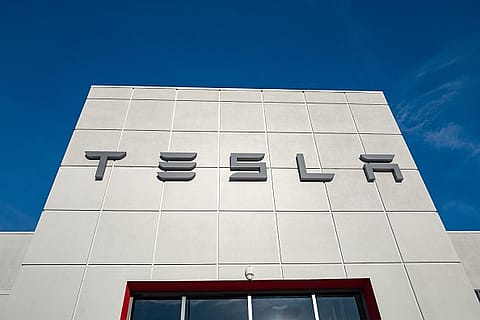Tesla forecasts 50% growth but chip shortage will hurt deliveries in 2022
The semiconductor crisis seems to finally catching up with the world’s most valuable automaker—which had circumvented the industry-wide malaise, taking a lead in manufacturing from legacy automakers

Tesla, the world’s most valuable automaker, has said in its fourth-quarter results that supply-chain constraints—fuelled by the global semiconductor crisis—can continue hampering production volumes this year. Elon Musk, its enigmatic CEO who rarely minces words, tells in an earnings call that albeit the company will produce 50% more vehicles than it did in 2021, the constraints brought by chip limitation is going to be the main deterrent in 2022, and does not see it alleviating before next year.
The company’s earnings document reads that its factories did not run at full capacity because of production-related challenges. Musk adds that the company will be unable to roll out new vehicles from its production lines—implying that the company’s Cybertruck pickup will not see the light of day before next year. “If we were to start building new vehicles this year, we would deliver fewer cars this year as our resources would be channeled towards the newer models,” he avers. For the uninitiated, the Cybertruck was unveiled in 2019, and was slated to hit the roads last year.
Tesla, taking a prudent stance on the semiconductor crisis and supply-chain impediments, indicates that it is not immune to the industry-wide malaise—which coerced legacy manufacturers around the world to halt production. The company was able to navigate around the crisis better than its peers by deviating from the industry-wide practice of outsourcing the electronic and software-related production. Musk insisted on doing things on their on—the company made use of the chips they procured and rewrote its software code for those chips.
“Tesla, born in Silicon Valley, never outsourced their software—they write their own code,” Morris Cohen, a professor emeritus at the Wharton School of the University of Pennsylvania, who specialises in manufacturing and logistics, told a New York-based daily earlier this month, adding that it did what other automakers could not timely do, and “controlled its destiny”.
Initially, the company was ridiculed for its abberating policy, as it struggled to produce vehicles and make the deliveries it promised. But as the semiconductor crisis engulfed the automobile world and was almost insurmountable and interminable, Tesla prevailed and got its retribution. Its deliveries were up 87% in 2021, and according to the company’s estimates, it achieved the highest quarterly operating margin among all volume OEMs.
Tesla made a record profit of $5.5 billion in 2021, over a revenue of $53.8 billion, but its shares—which were up 2% in market hours—teetered between gains and losses in trading after markets closed on Wednesday, emblematic of a “breakthrough year” for the company, but acknowledging that it too has been plagued by the semiconductor malady, along with pitfalls appurtenant to the cost of procuring raw materials; logistical costs, and labour-related issues.
Answering questions posed by investors, Musk says that the company is currently not working on the $25,000 (approximately ₹18.79 lakh) electric car. “We have enough on our plate, quite frankly,” he remarks. Tesla also expects to achieve its outlook from its factories in Fremont and Shanghai, but will also prioritise ramping up production in its production units in Germany and in Texas.
Recommended Stories
However, Tesla’s chief executive also significantly alludes that the company will be on the lookout for new production facilities. “2022 is the year where we will be looking at factory locations to see what makes more sense, and will possibly announce an update by the end of this year,” he says on the earnings call.
This comes at a time when the Austin-based company purportedly reached an impasse with the Indian government over its much-awaited launch in the subcontinent. Musk wants the government to waive off the import duty on completely built units, so that the company can offer vehicles to test the waters.
However, the government is not relenting to his demands, insisting that the automaker is welcome to set up a production unit in the country—a commitment which Tesla is not willing to make. He earlier took to Twitter to say that Tesla is “still working through a lot of challenges with the government”. This triggered a chain-reaction on Twitter, wherein ministers in state cabinets invited the company to set up its operations in their respective states.